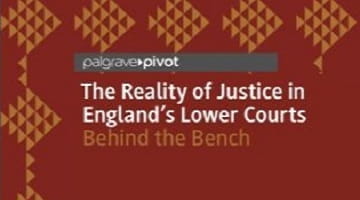Why study this course with LJMU?
- 90% of students surveyed said academic support on this course was good or very good (National Student Survey 2024)
- This is an accredited undergraduate psychology programme giving you eligibility for membership of the British Psychological Society on graduation
- Brings together the established disciplines of Criminology and Psychology for a unique perspective on individuals, society and the criminal justice system
- Recent increase in demand for criminal psychologists in prison programmes and offender management
- Contemporary research informed teaching in cutting-edge subjects such as terrorism and forensic psychology
- Established links with employers and agencies allow for excellent networking, volunteering and work experience opportunities
- Opportunity to undertake international fieldwork visits to places such as Ljubljana, Slovenia and Gothenburg, Sweden
About your course
The professionally accredited BSc (Hons) Criminology and Psychology at Liverpool John Moores University is informed by ongoing research and extensive links with practitioners. So you can be confident that your studies will be at the forefront of developments in this fascinating field.
The public and political controversies surrounding crime and criminal justice processes in the UK form an important and ongoing context for study.
This degree will take you on a critical exploration in the field of Criminology and Psychology meaning you will benefit from cutting-edge theory and practice from both disciplines.
Psychology is more concerned with developing a quantitative and qualitative understanding of the individual and what makes them tick, whereas criminologists examine society's responses to crime and justice in the context of everyday life.
This means you will graduate with an understanding of how crime occurs, who commits it, how it is measured and how criminal justice impacts on the lives of different social groups.
Course modules
What you will study on this degree
Further guidance on modules
Modules are designated core or optional in accordance with professional body requirements, as applicable, and LJMU’s Academic Framework Regulations. Whilst you are required to study core modules, optional modules provide you with an element of choice. Their availability may vary and will be subject to meeting minimum student numbers.
Where changes to modules are necessary these will be communicated as appropriate.
Core modules
Core modules
Optional modules
Core modules
Optional modules
Professional accreditation
This course is recognised by the British Psychological Society (BPS), which means that you will be eligible to join the Society on graduation. Membership of the BPS is recognition of your professional status and reflects your aspiration to represent the highest possible professional standards, so it will make a valuable addition to your CV and enable access to a range of postgraduate options.
Your Learning Experience
Excellent facilities and learning resources
We adopt an active blended learning approach, meaning you will experience a combination of face-to-face and online learning during your time at LJMU. This enables you to experience a rich and diverse learning experience and engage fully with your studies. Our approach ensures that you can easily access support from your personal tutor, either by meeting them on-campus or via a video call to suit your needs.
Teaching is delivered via a combination of lectures, workshops, seminars, online activities and one-to-one consultations with your tutors. You will also be expected to study independently and conduct your own self-directed research.
You will have access to our extensive collection of books and journals, many of which are available electronically in order to allow independent learning at a convenient time and place. These collections are regularly updated by academic staff, supported by our subject specialist librarians. Our libraries also contain spaces for group and individual study for those who prefer to learn 'on campus'. We also have access to a wealth of relevant databases, which you will be taught how to use as part of your degree programme. These resources allow students to carry out their own research, for example by helping locate relevant official publications or newspaper articles. We also use them as part of lectures and workshops.
Work-related Learning
Alongside your academic studies, you will gain range of transferable skills in analysis and interpretation, presentation, teamwork, initiative and research.
For example, the Dissertation module requires you to:
- identify an appropriate topic
- develop a programme of study
- present a clear, coherent and robust piece of written work
While the International Fieldwork module provides students with a unique opportunity to develop and improve these transferable skills within an international context.
Dedicated personal tutor, plus study skills support
It is often useful to discuss course-related issues on a one-to-one basis and for this reason we will assign you a personal tutor for the duration of your studies at LJMU. Your tutor will also help you put together your personal development plan so that you can monitor progress and set your own targets. Module tutors will provide support in the form of online learning materials, course guides and one-to-one consultations if you need them, and there will be study skills sessions to help you prepare for assessments.
Assessment varies depending on the modules you choose, but will usually include a combination of exams and coursework.
We understand that all students have different strengths and preferences when it comes to assessments, so we use a variety of methods to assess your work, including essays, exams, fieldwork projects, reports, case studies, portfolios, online blogs and wikis, work-place practice, posters, presentations (individual and group), debates, reviews and group work. You will normally receive extensive written feedback on your assessments and regular verbal feedback.
All feedback is designed to help you achieve your full potential and get the most out of your studies, so staff will be available to discuss it with you and direct you to further support if you feel you need it.
Your marks and feedback will be available within 15 working days of submitting a piece of work. That's because we believe that constructive feedback is vital in helping you identify your strengths as well as the areas where you may need to develop further.
Where you will study
What you can expect from your School
Based within the John Foster Building, in the Mount Pleasant Campus, the School of Justice Studies is a leading provider of education in Policing Studies, Criminology and Criminal Justice. We provide specific training for policing students wishing to enter the service as a graduate recruit. The John Foster Building has many outstanding facilities, including well-equipped IT Suites, a light-filled Student Common Room and dedicated study areas. At the back of the John Foster Building is the Aldham Robarts Library, where you can access an exceptional range of materials to support your studies.
Course tutors

Dr Stephen Wakeman
- Programme leader
We ensure teaching is informed by contemporary research, while maintaining excellent links with employers and agencies which can lead to good opportunities for student work placements
We ensure teaching is informed by contemporary research, while maintaining excellent links with employers and agencies which can lead to good opportunities for student work placements
Steve joined LJMU as a lecturer in criminology in August 2014 after completing his PhD in the Centre for Criminology and Criminal Justice at the University of Manchester. His PhD was an ethnographic study of heroin and crack cocaine users and dealers in the North-West of England. Prior to this he worked in drug rehabilitation centres, homeless hostels, and at a ‘problem’ youth project. Steve has knowledge and expertise in three main areas: drugs (specifically addictions, policy, and heroin and/or crack cocaine use/markets); media (specifically cultural representations of crime and deviance in popular and/or 'new' media); and criminological theory (specifically cultural, visual, critical criminologies, or any other progressive theory, as well as the use of autoethnographic methods in criminology). His work has been published in a number of leading criminology journals, and he is currently the reviews editor of the British Journal of Criminology. He is writing a book on autoethnographic criminology to be published by Routledge in 2021, and another with Tammy Ayres and Stuart Taylor about drugs and crime to be published by Sage in 2022. Steve would be happy to discuss potential PhD supervision with students in any area related to drugs, media or theory, but especially if the project has an autoethnographic element to it. Steve also has a very nice collection of retro adidas trainers, plays golf (poorly) and guitar (very, very poorly), and keeps a Boston terrier named Lennon that sometimes bites him.


Both sides of the degree complement each other greatly, adding that bit extra to your Honours degree.
Career paths
This BSc degree in Criminology and Psychology opens up a varied and exciting range of career opportunities.
The range of careers open to you once you graduate include:
- probation work
- youth justice
- drug referral schemes
- victim support
- police and prison services
- legal professions
- local government
- social work
- postgraduate study and research
Some graduates have even used their degree to secure a career in the media research, teaching and charity work. It is likely that you will encounter some of our graduates as guest lecturers during your own studies.
Student Futures - Careers, Employability and Enterprise Service
A wide range of opportunities and support is available to you, within and beyond your course, to ensure our students experience a transformation in their career trajectory. Every undergraduate curriculum includes Future Focus during Level 4, an e-learning resource and workshop designed to help you to develop your talents, passion and purpose.
Every student has access to Careers Zone 24/7, LJMU's suite of online Apps, resources and jobs board via the LJMU Student Futures website.
Tuition fees and funding
- Home full-time per year:
- £9,535
The University reserves the right to increase tuition fees in accordance with any changes to the maximum allowable fees set by the UK Parliament. In the event of such a change, any fee increase will be subject to a maximum cap of 10% of the total course cost as originally stated at the time of your offer.
The fees quoted above cover registration, tuition, supervision, assessment and examinations as well as:
- library membership with access to printed, multimedia and digital resources
- access to programme-appropriate software
- library and student IT support
- free on-campus wifi via eduroam
Additional costs
Although not all of the following are compulsory/relevant, you should keep in mind the costs of:
- accommodation and living expenditure
- books (should you wish to have your own copies)
- printing, photocopying and stationery
- PC/laptop (should you prefer to purchase your own for independent study and online learning activities)
- mobile phone/tablet (to access online services)
- field trips (travel and activity costs)
- placements (travel expenses and living costs)
- student visas (international students only)
- study abroad opportunities (travel costs, accommodation, visas and immunisations)
- academic conferences (travel costs)
- professional-body membership
- graduation (gown hire etc)
Funding
There are many ways to fund study for home and international students. From loans to International Scholarships and subject-specific funding, you'll find all of the information you need on our specialist funding pages.
Entry requirements
Please choose your qualifications below to view requirements
Grades/points required from qualifications: BBC-ABB (112-128)
Work out how many UCAS points your qualifications are worth by visiting the UCAS Tariff Calculator.
Qualification requirements
How to apply
Securing your place at LJMU
UCAS is the official application route for our full-time undergraduate courses. Further information on the UCAS application process can be found here https://www.ljmu.ac.uk/study/undergraduate-students/how-to-apply.
The following criteria are desirable but not essential. We will use them to rank applications.
Please demonstrate your development of these attributes in the personal statement included in your application:
- Good written and verbal communication skills, as you will be expected to convey knowledge to other people
- Good analytical skills, so that you can evaluate policies and practice
- Good reading and information retrieval skills - obtaining information from a range of sources and using it to support analysis
- An interest in social life and the issues and challenges it presents
Your university life
From accommodation and academic support to clubs and societies. Find out what LJMU has to offer.
Related Links
Talk to our students
Connect with a current LJMU student for advice and guidance on university life, courses and more.
See what our students are saying
At LJMU we want you to know you're making the right choice by studying with us. You can see what our students are saying about their experience with us through their reviews on the following websites:
Related Links
News and views
Browse through the latest news and stories from the university
The university reserves the right to withdraw or make alterations to a course and facilities if necessary; this may be because such changes are deemed to be beneficial to students, are minor in nature and unlikely to impact negatively upon students or become necessary due to circumstances beyond the control of the university. Where this does happen, the university operates a policy of consultation, advice and support to all enrolled students affected by the proposed change to their course or module.
Further information on the terms and conditions of any offer made, our admissions policy and the complaints and appeals process.




































